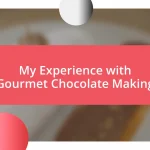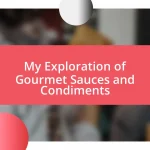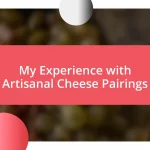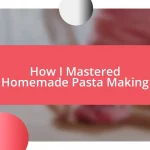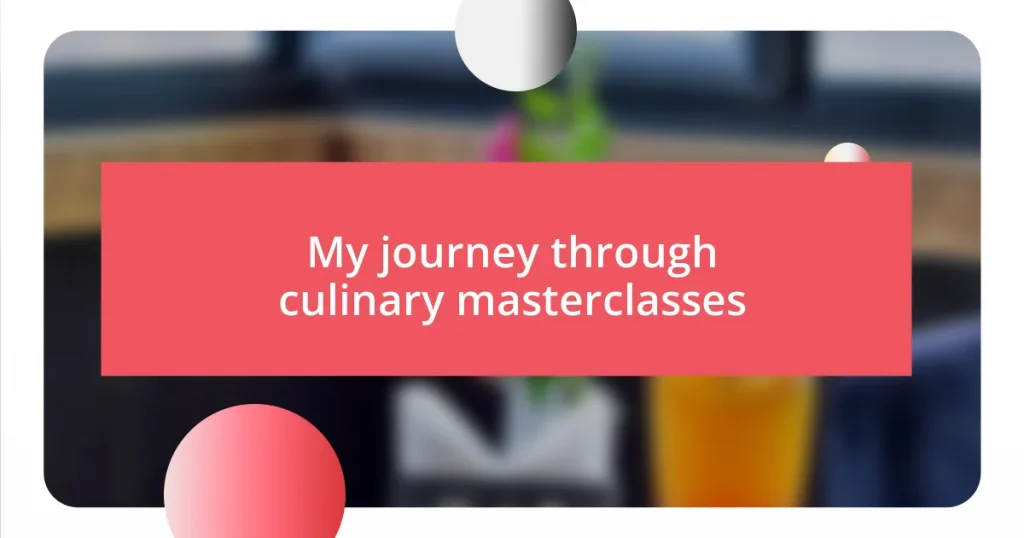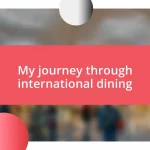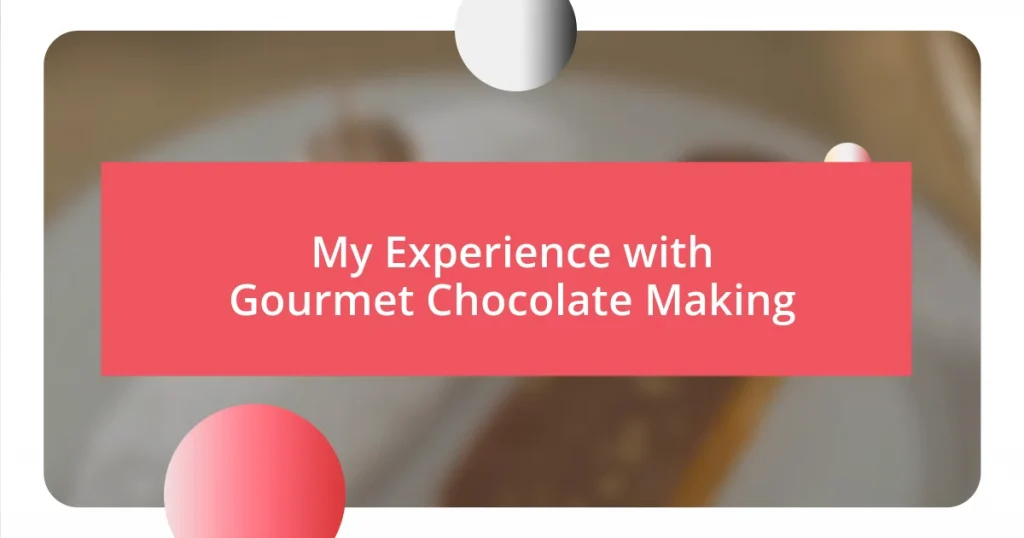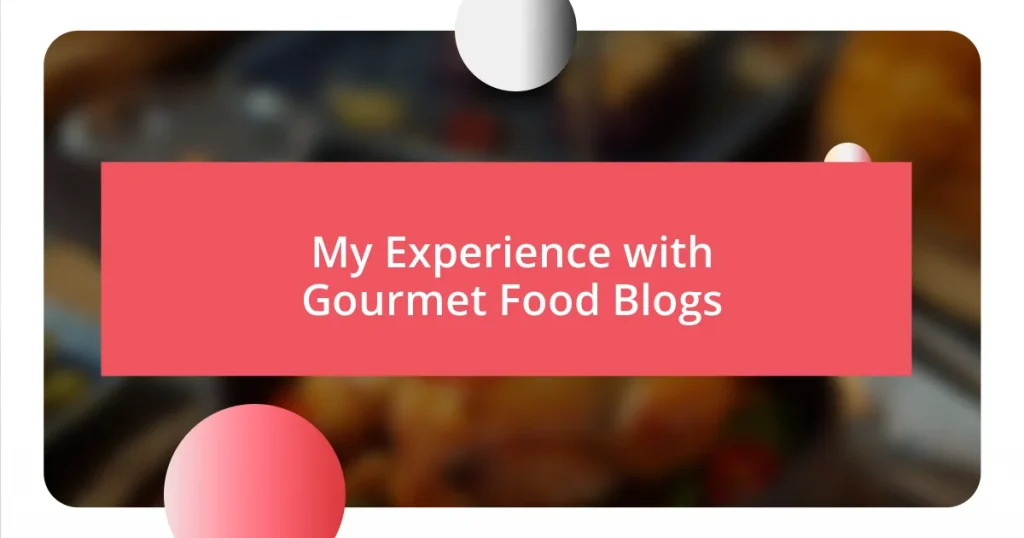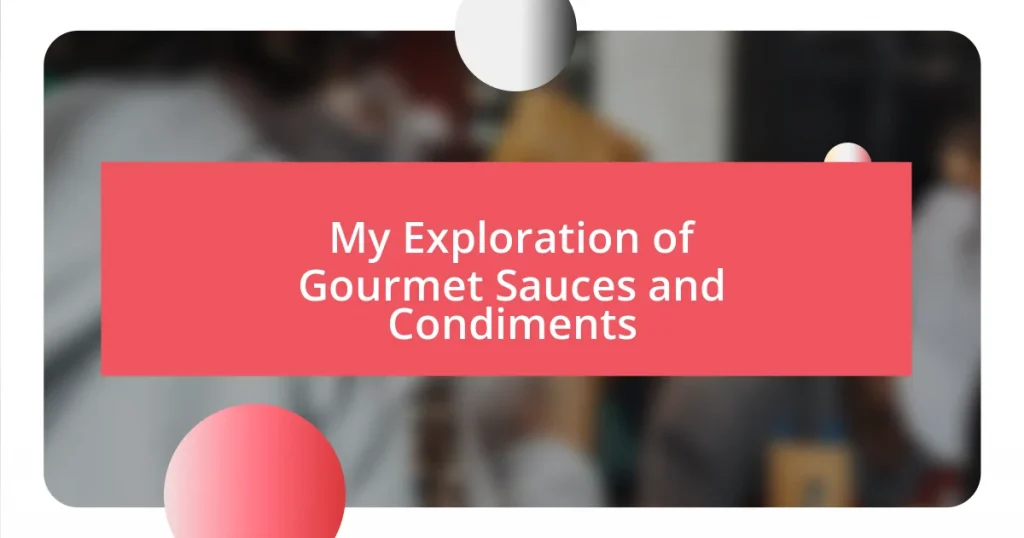Key takeaways:
- Start of culinary journey inspired by grandmother’s cooking, leading to a quest for mastery through failures and successes.
- Selection of culinary masterclasses should align with personal goals, balancing theory and hands-on practice for effective learning.
- Embrace challenges and constructive feedback in the kitchen as opportunities for growth and creativity.
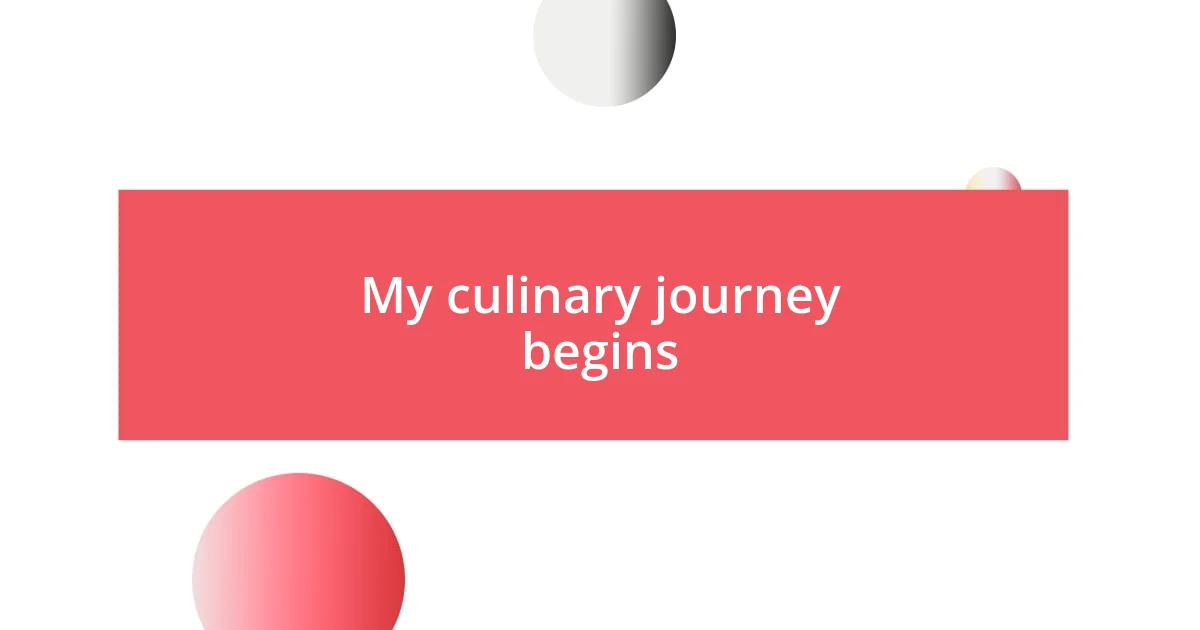
My culinary journey begins
My culinary journey began quite unexpectedly in my grandmother’s cozy kitchen. I remember standing on a stool, trying to reach the counter, as I watched her skillfully knead dough for her famous bread. The warm, yeasty aroma wrapped around me, and I felt an instant connection to the simple joy of cooking.
One vivid memory stands out: the first time I attempted to replicate her recipe. I was determined, yet as flour dust painted my kitchen, I wondered, “Can I really make it taste like hers?” When I took that first bite and realized my version was nowhere near the perfection she achieved, I felt both defeated and inspired. That moment marked the start of my quest for culinary mastery—a journey filled with both failures and successes.
Fast forward to today, and I can still feel the excitement mixed with apprehension every time I step into the kitchen. Each new recipe I try feels like another step in an adventure filled with discovery. Isn’t it fascinating how cooking can weave memories into our lives, shaping who we are in profound ways?
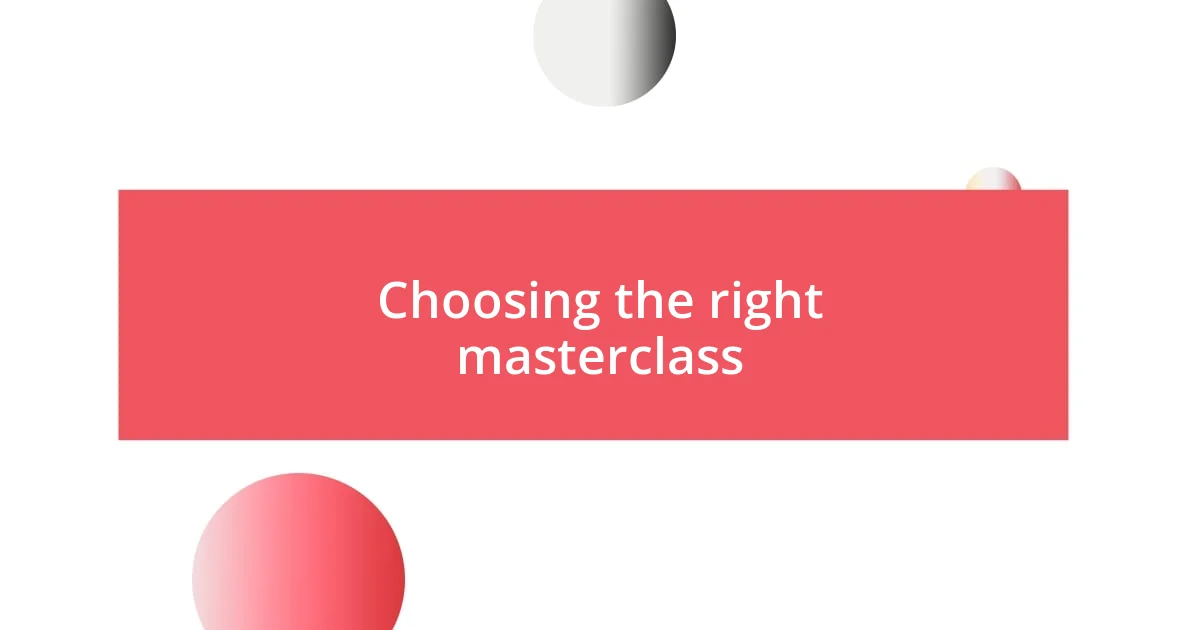
Choosing the right masterclass
When it comes to selecting the right culinary masterclass, I’ve learned that aligning the class with your personal cooking goals is crucial. For instance, if you’re keen on honing your pastry skills, seeking out a masterclass led by a renowned pastry chef can be incredibly rewarding. Remember the time I joined a class focused solely on desserts? The nuanced techniques I picked up were far beyond what I’d practiced alone, and it truly transformed my baking.
Not all masterclasses are created equal, though. Some focus heavily on theory, while others emphasize hands-on practice. I once spent my Saturday in a class that promised a deep dive into Italian cuisine, but we spent most of the time watching rather than doing. Reflecting on that experience, I realized that the structure and approach of the masterclass matter significantly. It’s essential to choose one that offers a balance between learning and practical application.
Consider how much time you can commit as well. Some masterclasses span only a few hours, while others stretch over several weeks. I remember hesitating to sign up for a longer workshop because of my busy schedule, but that decision ultimately paid off. The immersive experience allowed me to bond with fellow food enthusiasts and gain insights that quick classes simply couldn’t provide.
| Criteria | Short Masterclass | Extended Masterclass |
|---|---|---|
| Duration | 1-3 hours | Several weeks |
| Focus | Broad overview | In-depth techniques |
| Hands-on practice | Limited | Extensive |
| Networking | Minimal | High |
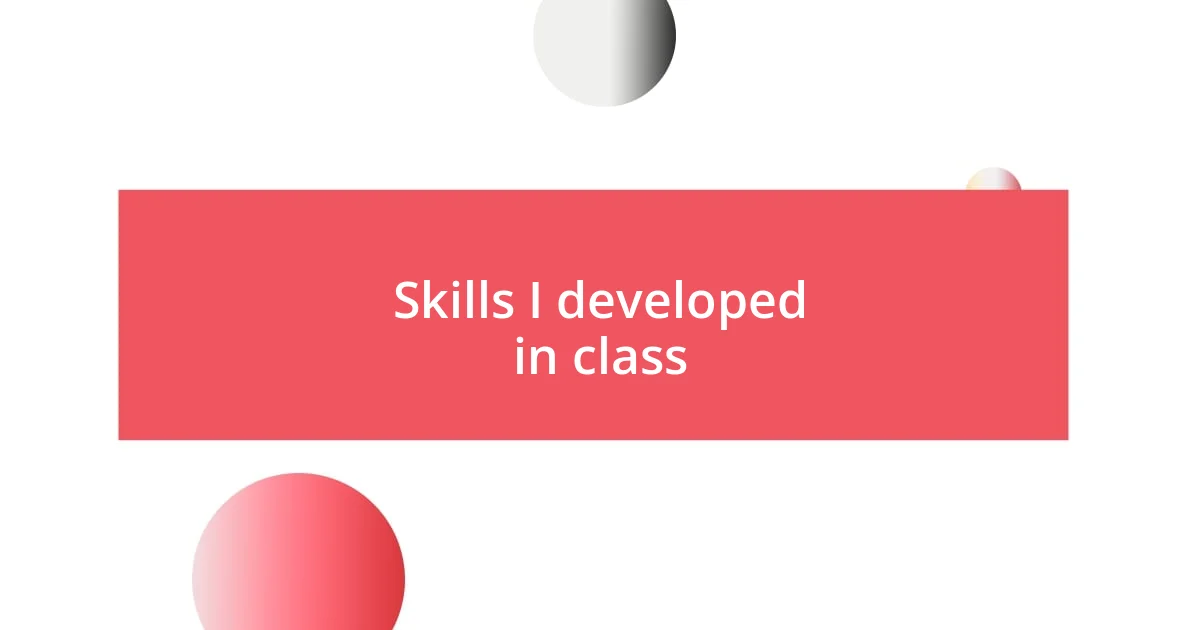
Skills I developed in class
Throughout my culinary masterclasses, I developed a myriad of essential skills that transformed my cooking game. One of the first was knife skills, which I initially underestimated. I recall standing there, the sound of my knife slicing through vegetables, feeling both empowered and a bit nervous. But with practice, I learned not just to chop but to embrace the rhythm of cooking, making the process feel almost meditative.
Here’s a list of some skills I honed during these intense yet rewarding sessions:
- Knife Skills: Mastered proper chopping techniques, improving speed and safety.
- Flavor Profiling: Learned to combine ingredients for balanced and delightful flavors.
- Plating Techniques: Discovered the art of presentation, making dishes visually appealing.
- Time Management: Juggled multiple tasks simultaneously, developing a flow in the kitchen.
- Food Safety Practices: Gained knowledge on hygiene and proper food handling.
Each class added a new layer to my culinary repertoire, making me feel more confident and capable. The growth felt almost palpable, especially during one particular session when I recreated a complex dish that previously intimidated me. I vividly remember the sense of accomplishment when I plated it exactly as I envisioned. It was a true testament to my developing skills.
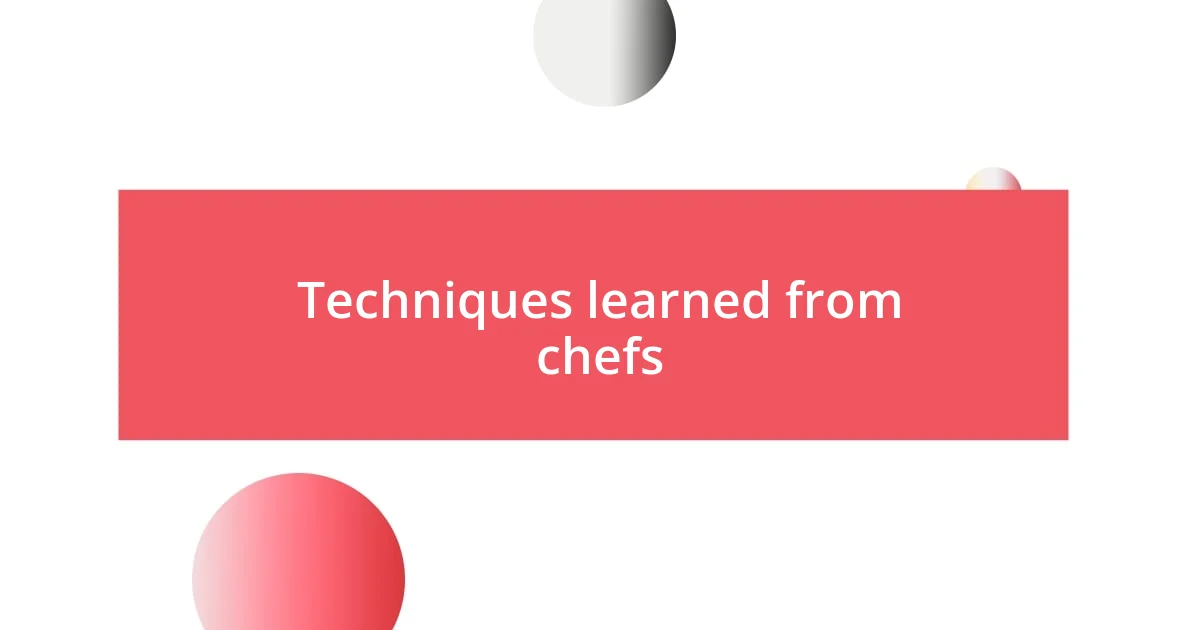
Techniques learned from chefs
One key technique I learned from the chefs that really stuck with me is emulsification, particularly when it comes to salad dressings. I can still picture the moment when a chef demonstrated the magic of combining oil and vinegar. The moment he whisked them together, I was amazed to see how they transformed into a cohesive blend. Have you ever tasted a homemade vinaigrette? The difference in flavor is night and day compared to store-bought versions! It’s a simple skill, but mastering it has changed how I approach not just dressings, but also sauces.
Another impactful lesson came from understanding the importance of seasoning. During one masterclass, a chef passionately explained how just a pinch of salt can elevate a dish. He had us taste food at various stages – before and after seasoning. The difference was astonishing! I remember feeling a light bulb moment when it clicked: seasoning isn’t just about flavor; it’s about bringing out the best characteristics of each ingredient. It’s a technique you can apply universally, and it truly enhances everything I cook.
Lastly, I can’t overlook the impact of knife techniques on my culinary journey. The precision of a chef’s cuts can turn ordinary ingredients into refined dishes. I found myself fascinated by how a chef demonstrated the quick, fluid motion of a julienne technique. The speed and efficiency left me both inspired and a bit intimidated. Yet, with guidance and practice, I found my own rhythm. Have you ever felt that exhilarating rush when you finally nail a technique? It’s a rewarding experience, reminding me that growth in the kitchen often comes with practice and patience.
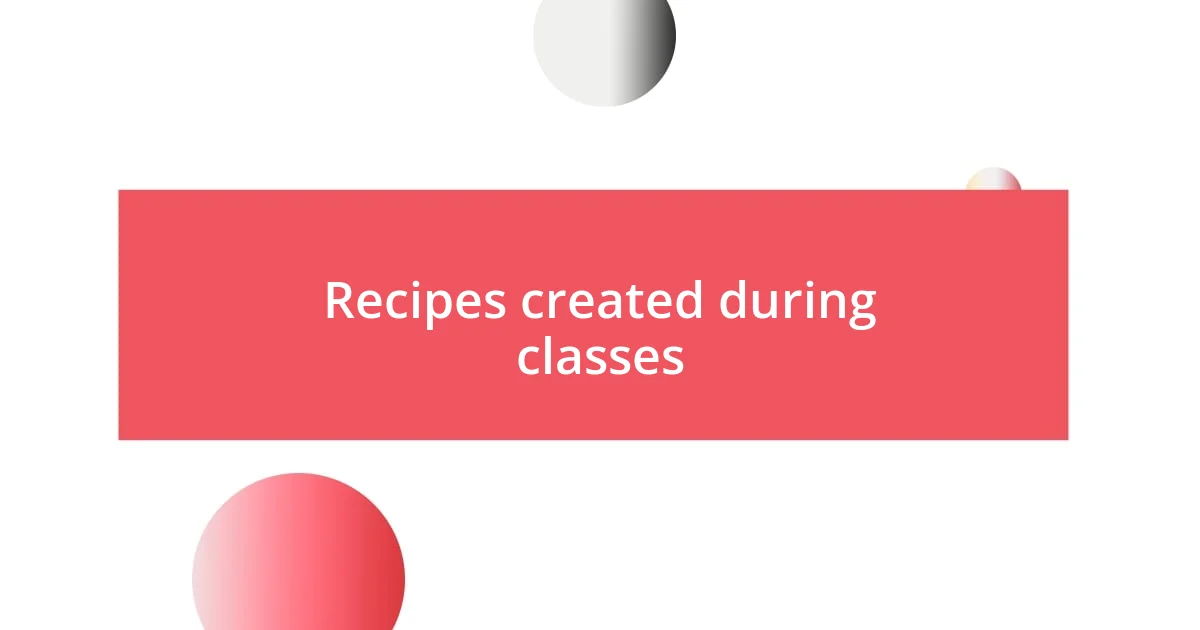
Recipes created during classes
During my classes, I had the opportunity to create some truly memorable dishes. One standout moment was when I experimented with a homemade pasta recipe. The rhythm of kneading the dough and the satisfaction of rolling it out by hand was intoxicating. How can something so simple taste exponentially better when you make it from scratch? The moment I took my first bite of that silky fettuccine, I understood the magic that comes from building flavors and textures yourself.
Another recipe that sticks in my mind is the aromatic Thai green curry we crafted during one session. I remember the bright colors of the fresh ingredients, the fragrance of lemongrass filling the air, and the unraveling complexity of flavors as we sautéed each element. The chef emphasized the balance of heat and sweetness, and I felt an exhilarating rush as I adjusted the spiciness to my liking. Have you ever experienced a dish that just felt like a warm hug from the inside? That curry did just that, and it opened my eyes to the importance of personalizing recipes.
One of my proudest achievements was creating a stunning dessert—a chocolate soufflé—during a pastry class. I can still recall the tension in the room as we whipped the egg whites to just the right peak. The suspense as I carefully folded the mixture was almost palpable. When it emerged from the oven, perfectly risen and glistening, I felt like I’d created something truly special. Have you ever poured your heart into a dish and felt like it was a reflection of you? That soufflé represented not just culinary skill but also the joy of creating something beautiful from scratch.
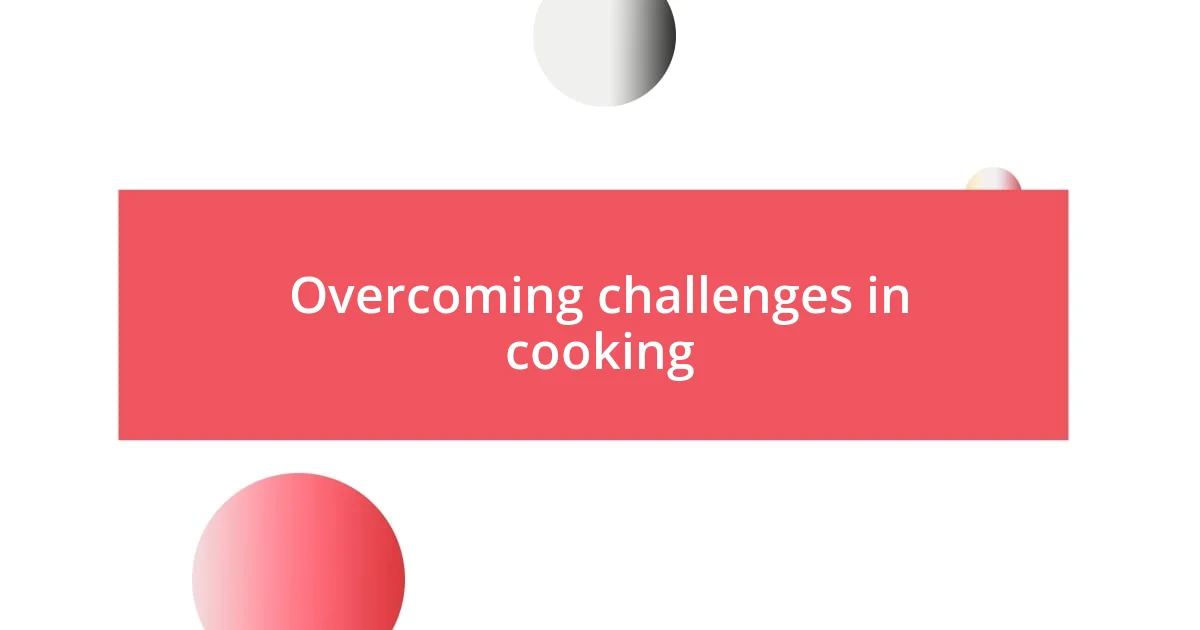
Overcoming challenges in cooking
Amidst the exhilarating chaos of cooking, overcoming challenges can feel like an uphill battle. I vividly remember my first attempt at making a soufflé—so many things could go wrong! When the chef advised us not to open the oven door, my heart raced as I fought the urge to peek. It turned out perfectly! That moment taught me that sometimes, the toughest challenges lead to the sweetest successes. How often do we forget that patience is a vital ingredient in the kitchen?
Another daunting challenge I’ve faced is managing my time effectively while cooking. I found myself overwhelmed during a class when the chef announced we had only thirty minutes to prepare a multi-course meal. The clock seemed to tick louder with each passing second. I had to quickly prioritize tasks and focus on what truly mattered. I learned that breaking a dish into smaller steps can simplify the process and help maintain my composure. Have you ever felt time slipping away, only to discover that a little organization could have made all the difference?
Lastly, I grappled with the fear of failure, especially early on in my culinary journey. I recall a day when I attempted a complex braising technique, only to end up with an overcooked, dry dish. It was disheartening, but rather than letting it defeat me, I chose to embrace it as a learning opportunity. I realized that mistakes happen to everyone in the kitchen; it’s how we respond that truly counts. Have you ever found yourself learning more from a flop than from a flawless dish? In retrospect, I treasure those moments because they pushed me to grow and refine my skills.
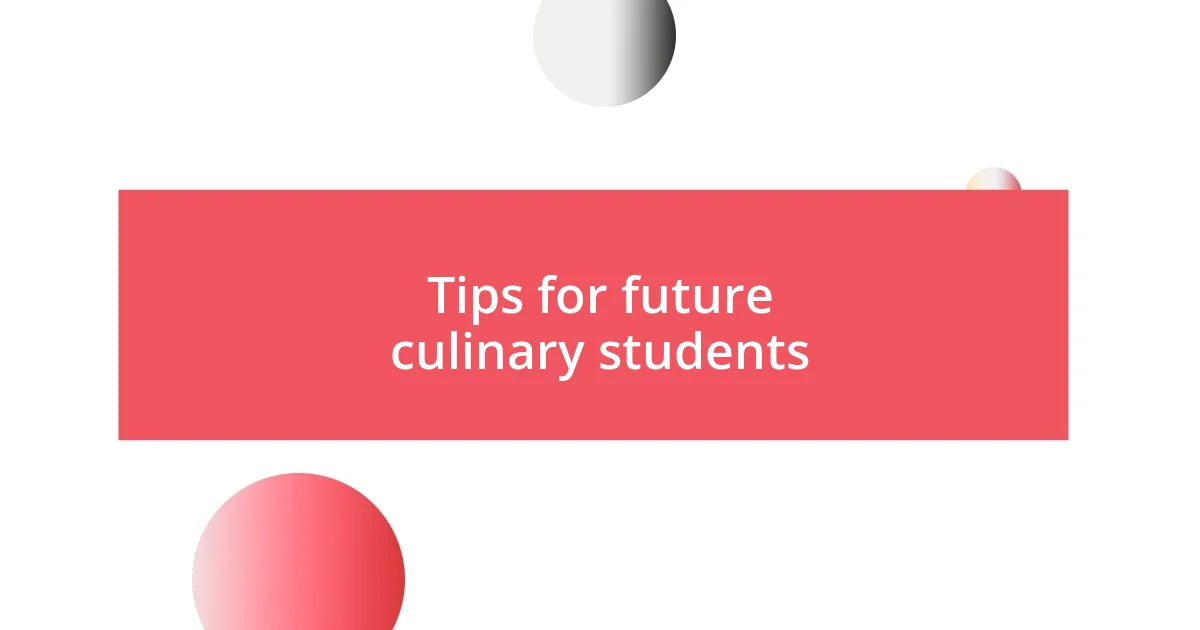
Tips for future culinary students
Embarking on a culinary journey is as much about developing a mindset as it is about mastering techniques. I’ve learned that passion fuels creativity in the kitchen. So, find what excites you—perhaps it’s baking bread or perfecting sauces—and dive deep into that interest. Have you ever noticed how enthusiasm can transform even a simple dish into something extraordinary? I can still vividly recall the joy I felt when I perfected my first artisan loaf; it was as if I’d discovered a hidden recipe for happiness.
Additionally, make an effort to embrace constructive criticism. During my classes, a chef once pointed out that I used too much salt in my dish. At first, I felt defensive, but then I realized he was helping me push my boundaries. That moment of vulnerability taught me that feedback can be a gift, guiding us toward improvement. Have you ever considered that the kitchen is a perfect setting for personal growth? Each critique is an opportunity to refine our skills and develop a deeper understanding of flavor.
Finally, don’t shy away from experimentation. I remember once mixing unexpected ingredients and creating what I believed was a disaster. But, to my surprise, it turned into one of the most unique dishes I’ve ever served. It taught me that the kitchen is a playground where mistakes can lead to delightful surprises, opening the door to innovation. Have you ever stumbled upon a new favorite dish by simply trying something out of the ordinary? I encourage you to take culinary risks; you never know what delicious creation might be waiting just around the corner.
